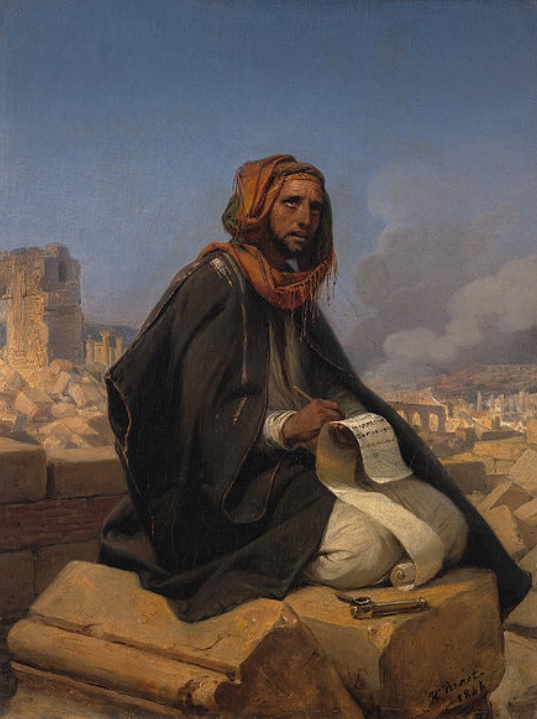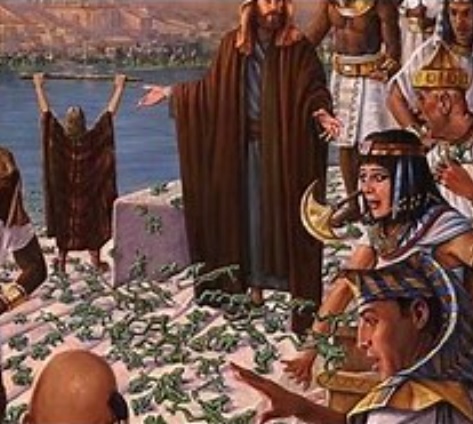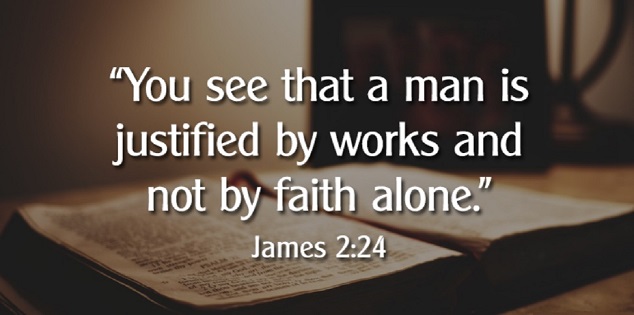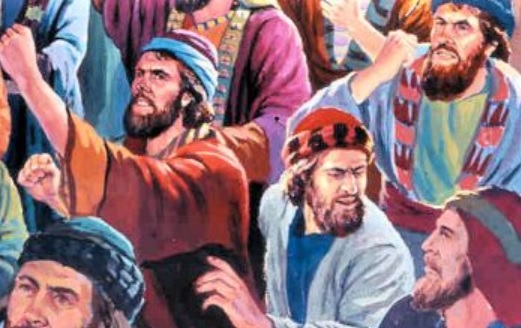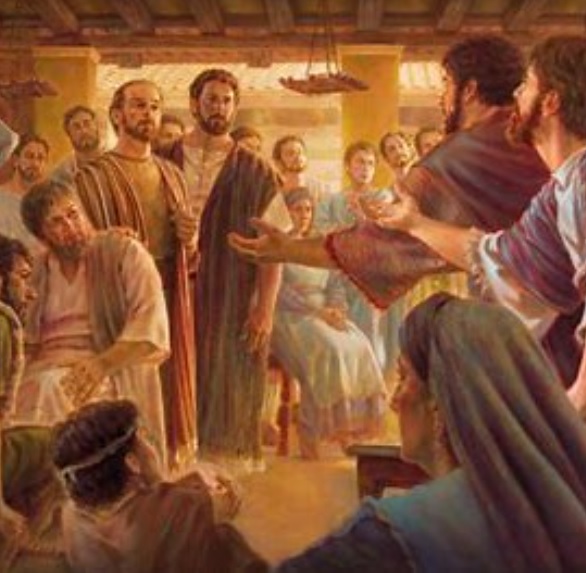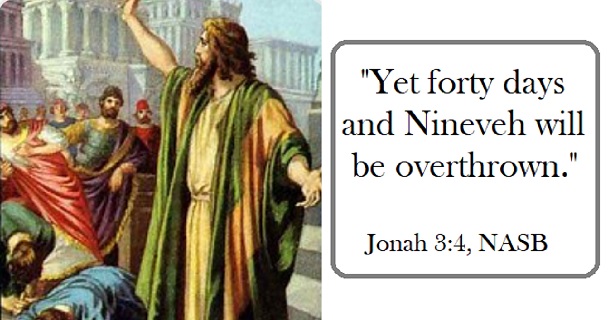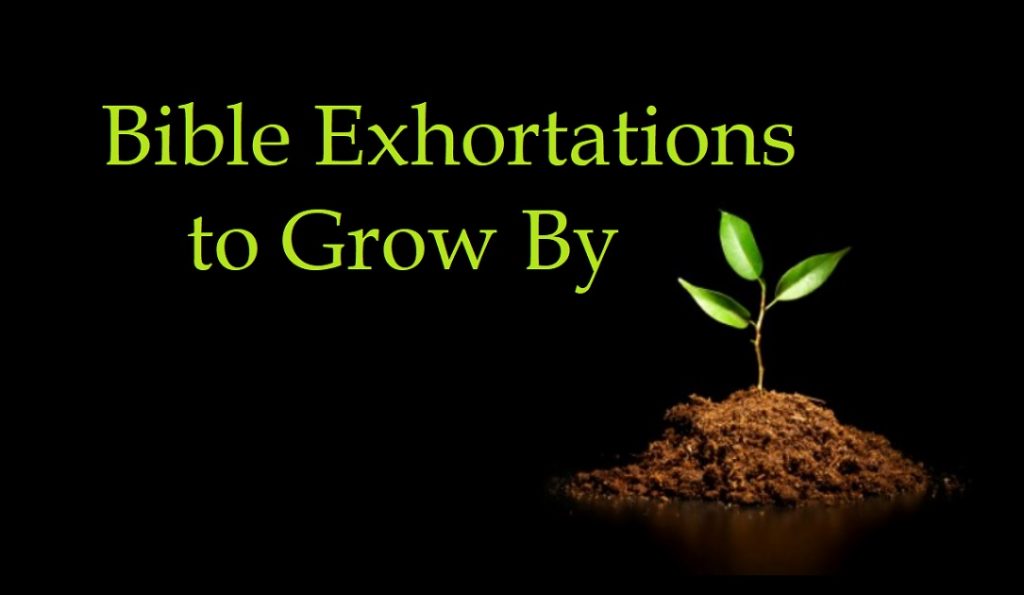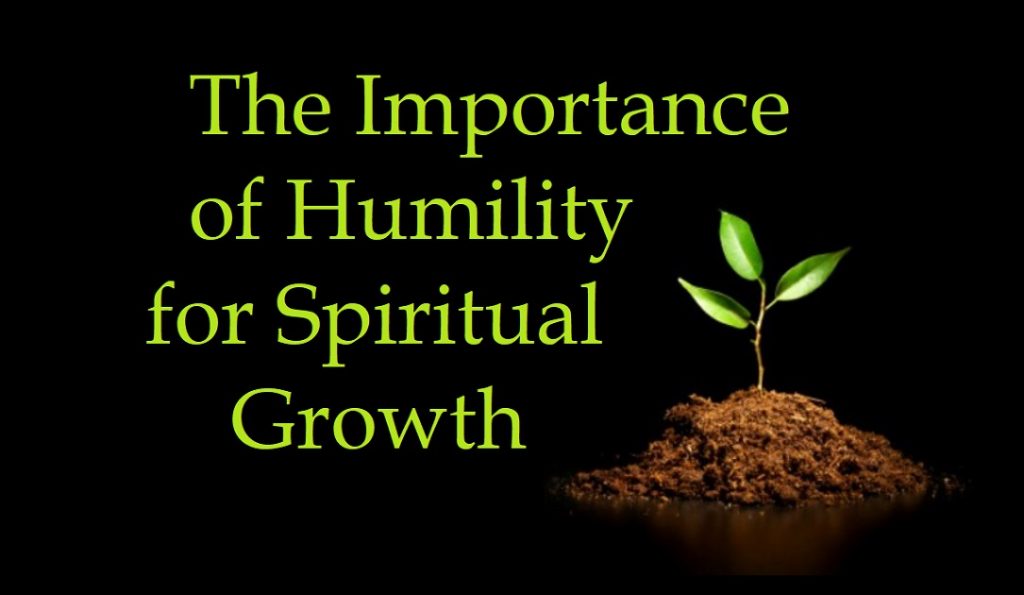“Go therefore and make disciples of all the nations…teaching them to observe all that I commanded you; and lo, I am with you always, even to the end of the age” (Matthew 28:19-20, NASB).
——————–
Contents:
1) The Fulfillment of Bible Prophecy: A Reason to Believe in Jesus and the Bible (Tom Edwards)
2) Are Miraculous Gifts Still for Today? (video sermon, Tom Edwards)
3) News & Notes
——————–

-1-
The Fulfillment of Bible Prophecy:
A Reason to Believe in Jesus and the Bible
Tom Edwards
By their very existence, the wonders of creation indicate the need for an eternal Creator with superior intelligence. The creation, therefore, is one of the reasons we can believe in God.
Another evidence of the reality of God is the fulfillment of Bible prophecy. So let us consider some of those prophecies this day.
It has been said that there are 332 prophecies in the Old Testament concerning Jesus. Many of these are very specific in their application and not merely generalizations that could cover a wide range of possibilities. For instance, the Bible shows that Jesus would be betrayed for not 29, nor 31, nor 52, nor any other number except 30 pieces of silver. How more specific could that be! (See Zech. 11:1-13; Matt. 26:14-16; Matt. 27:3-10.)
Furthermore, the Bible prophesied hundreds of years before Christ came into the world that Jesus would be born in not just the land of Canaan, nor not just in the southern part of Canaan, nor not just in the territory of Judah; but, specifically, Jesus would be born in the little town of Bethlehem (Micah 5:2; cf. Matt. 2:1).
The Bible also foretells that Jesus would be a descendant of Abraham (Gen. 22:18; Gal. 3:16; Matt. 2:1-2), that He would be conceived miraculously by a virgin (Isaiah 7:14; Matt. 1:18-25); that His hands and feet would be pierced (Psa. 22:16; Mark 15:25; Luke 24:38-40); that His garments would be divided among some individuals, and for His clothing they would cast lots (Psa. 22:18; John 19:23-24). The fulfillment of these latter prophecies are seen during the crucifixion of Christ.
His death is also depicted as being one in which His “strength is dried up like a potsherd” (which is a broken piece of pottery, especially an ancient one), and His “tongue cleaves to” His “jaws” (Psa. 22:15). Thus indicating the extreme thirst Christ would experience while on the cross, which has also been referred to as being one of the most excruciating aspects of the crucifixion.
The significance in the prophetic statement that Christ could “count all His bones” (Psa. 22:17) is that the bones of the other two whom Jesus was crucified with were broken in order to speed up their deaths so that their bodies could be removed before the Sabbath. But that was not necessary for Jesus because His body had already died, after six hours of suffering on the cross (See John 19:31-33).
After His death, another Old Testament prophecy was fulfilled when one of the Roman soldiers pierced the Lord’s side and out came water and blood (Zech. 12:10; John 19:33-37).
Psalm 22 is one of the Messianic psalms that well describes the scene of the crucifixion. Try reading that along with Isaiah 53, which also contains Messianic prophecy of the Lord’s suffering and death at Calvary.
In Isaiah, the deceased body of Jesus is seen to have been “with a rich man” (Isa. 53:9). The gospel narrative shows this “rich man” to have been Joseph of Arimathea who provided the Lord with a new burial tomb that had been hewn out of rock (Matt. 27:57-60). This then explains how that the Lord was involved with a rich man in His death.
We must also bear in mind that these Old Testament prophecies were written hundreds of years before man even had the New Testament and prior to the Lord’s incarnation. The Old Testament, with its numerous inspired prophecies, was completed about 450 B.C.; and, therefore, the Bible was not written all at one time. Actually, it was written over a period of approximately 1,500 years by about 40 different men of various backgrounds. Yet, harmony is still seen throughout the many books that are part of the Bible. This refutes the misconception that simply one person made up the Bible to accommodate his fancy. For without the help of God’s divine inspiration, the Bible could not have been written; and this is clearly seen in the account of Bible prophecies and their fulfillments which occurred hundreds of years after they were first prophesied.
Years ago, I read a couple articles that made a lasting impression concerning the odds of Biblical prophecies if their fulfillments were merely by chance. Though some folks might feel that anyone could have fulfilled these prophesies about Jesus, they would be very wrong for thinking so. For, as we have seen, some of these prophetic scriptures were very specific in their fulfillments and not generalizations. So unique were these prophecies to the Savior alone that the Christian Victory Publishing Company of Denver, Colorado, was once offering a $1,000 reward to anyone who could find someone other than Jesus — dead or alive — who fulfilled just half the prophecies in Fred John Meldeau’s book, Messiah in Both Testaments. This book deals with just some of the prophecies in the Old Testament concerning the Lord, and the contestant would have to find someone who fulfilled only half of these — but no one was ever able to do so. For Jesus is the only fulfiller of them.
Even more interesting was the finding of Peter Stoner who in a book entitled Science Speaks had calculated the odds of Bible prophecy if their fulfillments were merely due to chance or coincidence. Mr. Stoner dealt with just 8 of the prophecies that point to Jesus, and he even omitted the prophecy about the virgin birth in order to lessen the odds. What were the odds of these 8 prophecies finding fulfillment through mere chance? It was 1 in 10 to the 17th power. To illustrate the magnitude of 10 to the 17th power, Mr. Stoner asked the reader to imagine the state of Texas (with its 268,597 square miles or 695,663 square km) two feet deep in silver dollars. Just imagine how many would fill your living room at two feet deep, or how many would cover the block on which you live, or how many could be dispersed across your town until it was covered two feet deep, or for an amount this tall to blanket the county in which you reside. Unquestionably, these amounts would be exceedingly massive, but even more so is the area that it really would cover, which is the size of the state of Texas and that two feet deep in silver dollars. The number of coins it would take to do that is 10 to the 17th power — or 1 with 17 zeros after it!
Mr. Stoner continued his illustration by adding to it a blindfolded man who could travel anywhere over that state that he wished. And if he could then choose on his first try that one specially marked silver dollar, out of that colossal, statewide mass, it would be the odds of 1 in 10 to the 17th power.
So that is also the odds of just 8 Bible prophecies — had they randomly come to pass by mere chance.
Next, Mr. Stoner dealt with 48 prophecies and found their odds of fulfillment, if by coincidence, to be 1 in 10 to the 157th power. This, of course, would require more than the state of Texas to illustrate it. For 10 to the 157th power is said to be “more than the number of cubic centimeters, or subatomic particles like electrons and neutrinos, in the observable universe” (Wiki User).
As mentioned prior, however, there are more than just 48 prophecies in the Old Testament about Jesus — and more than even 300. But just in viewing the odds of the 8 and of the 48, if they were to have come to pass by merely sheer luck, is so astronomical that the possibility of chance is ruled out, and the inspiration of God’s word is confirmed. Peter writes in 2 Peter 1:20-21 the following: “But know this first of all, that no prophecy of Scripture is a matter of one’s own interpretation, for no prophecy was ever made by an act of human will, but men moved by the Holy Spirit spoke from God.”
Many people often marvel today at the so-called clairvoyants or fortunetellers who have some of their predictions come true, but according to Deuteronomy 18:20-22, God’s test for a true prophet was 100% accuracy — for anything less resulted in death!
Down through the years the Bible has been attacked by many an unbeliever. Someone once said that Ingersoll, who was a 19th century U.S. lawyer, political leader, orator, and lecturer, once declared, as he held up a copy of the Bible, “In fifteen years I’ll have this book in the morgue.” Fifteen years rolled by, and it was Ingersoll, and not the Bible, who was laid in the morgue — the Bible living on!
As Jesus Himself states: “Heaven and earth will pass away, but My words shall not pass away” (Matt. 24:35, NASB).
Neighbor, you can believe the Bible to be the inspired word of God. For Bible prophecy is just one of the sources that clearly confirms this to be so. It is one of the reasons why we can believe in God and accept His word as truth.
Real Bible faith, therefore, is not a mere “leap in the dark”; but, rather, it is a faith based on various evidences. And Bible prophecy, along with its fulfillment, is one of them.
— Via The Gospel Observer, June 2, 1991 (revised)
——————–
-2-
Are Miraculous Gifts Still for Today?
Tom Edwards
To play the video sermon with the above title, just click on the following link while on the Internet:
https://thomastedwards.com/wordpress/Miraculous_Gifts.mp4
——————–
-3-
News & Notes
Folks to be praying for:
It is good to hear that Mia Music has come out of her coma, had surgery on her neck last week, and is now able to eat soft foods. This week, she will be having surgery on the two breaks in her wrist.
A.J. Joyner and his wife Pat are still dealing with Covid-19; but Pat is doing somewhat better. Their daughter Pam Sanders, who had come to take care of them, has experienced some Covid-19 symptoms for about a week; but for the last 2 days, she has no longer had a fever.
After 2 weeks in the hospital with Covid-19, Tim Kirkland is finally back home; but is to remain quarantined for a few days. His wife Barbara is also healing from it.
Ronnie & Melotine Davis had to be rescheduled to September 9 for the injections to help with their back pains.
Bennie Medlock’s eye surgery has been re-scheduled for the middle of September.
Also to keep in prayer: Rick Cuthbertson, Jeff Nuss, Alisha Hunter, Michael Rittenhouse, Nell Teague, Rex Hadley, and our shut-ins.
——————–
The Steps That Lead to Eternal Salvation
1) Hear the gospel — for that is how faith comes (Rom. 10:17; John 20:30-31).
2) Believe in the deity of Jesus Christ, the Son of God (John 8:24; John 3:18).
3) Repent of sins. For every accountable person has sinned (Romans 3:23; Romans 3:10), which causes one to be spiritually dead (Ephesians 2:1) and separated from God (Isaiah 59:1-2; Romans 6:23). Therefore, repentance of sin is necessary (Luke 13:5; Acts 17:30). For whether the sin seems great or small, there will still be the same penalty for either (Matt. 12:36-37; 2 Cor. 5:10) — and even for a lie (Rev. 21:8).
4) Confess faith in Christ (Rom. 10:9-10; Acts 8:36-38).
5) Be baptized in water for the remission of sins (Mark 16:16; Acts 2:38; 22:16; 1 Pet. 3:21). This is the final step that puts one into Christ (Gal. 3:26-27). For from that baptism, one is then raised as a new creature (2 Cor. 5:17), having all sins forgiven and beginning a new life as a Christian (Rom. 6:3-4). For the one being baptized does so “through faith in the working of God” (Col. 2:12). In other words, believing that God will keep His word and forgive after one submits to these necessary steps. And now as a Christian, we then need to…
6) Continue in the faith by living for the Lord; for, if not, salvation can be lost (Matt. 24:13; Heb. 10:36-39; Rev. 2:10; 2 Pet. 2:20-22).
——————–
Tebeau Street
CHURCH OF CHRIST
1402 Tebeau Street, Waycross, GA 31501
Sunday: 9 a.m. Bible Class and 10 a.m. Worship Service.
(Sunday afternoon and Wednesday services are temporarily canceled, due to Covid-19; but we do have a “Song Service” at 5 p.m. for every first Sunday of the month, in which several different men lead the singing.)
evangelist/editor: Tom Edwards (912) 281-9917
Tom@ThomasTEdwards.com
https://thomastedwards.com/go/all.htm (This is a link to the older version of the Gospel Observer website, but with bulletins going back to March 4, 1990.)
